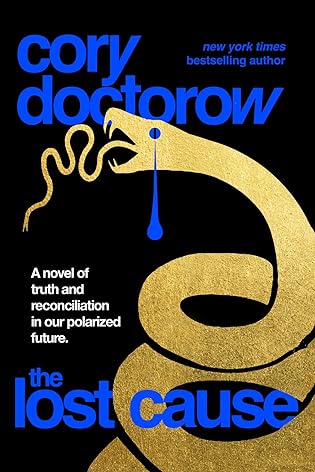 The Lost Cause by Cory Doctorow
The Lost Cause by Cory Doctorow Format: eARC
Source: supplied by publisher via Edelweiss
Formats available: hardcover, paperback, ebook
Genres: climate fiction, dystopian, science fiction
Pages: 368
Published by Tor Books on November 14, 2023
Purchasing Info: Author's Website, Publisher's Website, Amazon, Barnes & Noble, Kobo, Bookshop.org, Better World Books
Goodreads
It’s thirty years from now. We’re making progress, mitigating climate change, slowly but surely. But what about all the angry old people who can’t let go?
For young Americans a generation from now, climate change isn't controversial. It's just an overwhelming fact of life. And so are the great efforts to contain and mitigate it. Entire cities are being moved inland from the rising seas. Vast clean-energy projects are springing up everywhere. Disaster relief, the mitigation of floods and superstorms, has become a skill for which tens of millions of people are trained every year. The effort is global. It employs everyone who wants to work. Even when national politics oscillates back to right-wing leaders, the momentum is too great; these vast programs cannot be stopped in their tracks.
But there are still those Americans, mostly elderly, who cling to their red baseball caps, their grievances, their huge vehicles, their anger. To their "alternative" news sources that reassure them that their resentment is right and pure and that "climate change" is just a giant scam.
And they're your grandfather, your uncle, your great-aunt. And they're not going anywhere. And they’re armed to the teeth.
The Lost Cause What do we do about people who cling to the belief that their own children are the enemy? When, in fact, they're often the elders that we love?
My Review:
The younger generation has ALWAYS been going to the dogs. Graffiti found by Napoleon’s soldiers, stating EXACTLY that point, that “This younger generation is going to the dogs!” was written in hieroglyphs and was determined to have been etched on that wall in 800 BCE. There’s a similar quote from Socrates that merely goes back to sometime between 470 and 399 BCE. If we ever discover a stone carving or the equivalent left by the Neanderthals, they probably thought it too. Just as we do today.
And as we undoubtedly will thirty years from now, or thereabouts. But the generational fight we’re in the midst of right now isn’t just that – although it is certainly also about that.
It’s also about the same neverending, utterly frustrating argument that 18-year-old Brooks Palazzo has been having with his grandfather – and witnessing his grandfather and his old cronies have with the country and the world around him – for his entire life.
Because Dick Palazzo and his friends are members of the local Maga Club, wearing faded red hats and spouting the exact same neo-Nazi conspiracy-tinged quasi-conservative rhetoric that the original Magas did back in the day – which just so happens to be our day.
But in Brooks’ Palazzo’s 2050s, climate change and progressive policies have come 30 years down the road they’re already on. Universal Basic Income is part of the Green New Deal the Magas hate so much, but the climate change they’ve denied until it’s too late to fix has created a new class of refugee in American citizens, born and bred, whose homes and entire cities have either burned up in uncontainable wildcat fires, become Superfund sites because those same fires exploded something toxic that should never have been buried in the first place, or simply got washed away by the rising oceans being fed by runaway global warming.
Young Brooks Palazzo and his young and idealistic friends are all set to welcome a caravan of internal refugees to the hometown they know and love, Burbank, California. They know they have the resources, they know they have the room, they know they have the skills to pull Burbank into the future and bring all their friends and all the friends they’ll make in the future along for the hard work as well as the ride.
But his Gramps’ old buddies, all those old Magas, have a plan to stop that future before it happens. Because they are dead certain that the ship is sinking, and that Burbank doesn’t have enough resources to support the people it already has, let alone the ones that are coming.
They’ll do anything they can to stop the future and the Green New Deal in its tracks. No matter what it takes. And no matter who or what they have to kill. Democracy, the rule of law, innocent children, their neighbors who don’t believe as they do. Themselves even, because martyrs are a great recruiting tool.
And haven’t we seen it all before?
Escape Rating B: In spite of everything I’ve said above, this isn’t actually a dark book. But it’s easy to get caught up in its implications and see a long dark night coming that may make the historical Dark Ages look like a shining beacon of light – if only because the human species wasn’t in danger of extinction at the time.
And there I am, going dark again.
Let me try and wrench this back to the lighter side of this story – which is very much present. The story is told from the perspective of Brooks and his friends as they do their damndest to push forward towards a future. On every page, and in spite of every setback, they still have hope and they’re still working towards it.
They have a vision for a better Burbank, a better country, and even a better world, by taking the lessons they’re learning in this crisis and applying them to the next. They may very well be “fighting the long defeat” to paraphrase Tolkien, but they are there for that long haul and have hopes that it will be made – even if they aren’t the ones to make it.
Because that’s not the point of the struggle but a struggle it most definitely is. They do get down, and some of them bail and all of them want to at different points but they keep living and keep trying.
I found this a compelling read. I groaned when Brooks and Company lost a fight, and grinned when they overcame one of the many, many obstacles in their way. They may be fighting the long defeat but they are glorious in that fight. But part of the premise of the story is that neither side truly wants to let the world burn, they just have diametrically opposed beliefs about the way to prevent that burning or if preventing that burning is even possible. And I’m not sure I still believe that, although I wish I did.

















